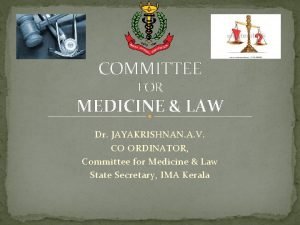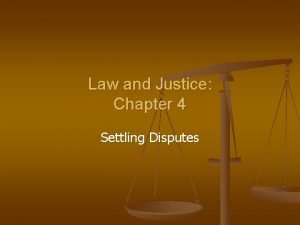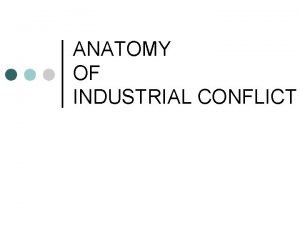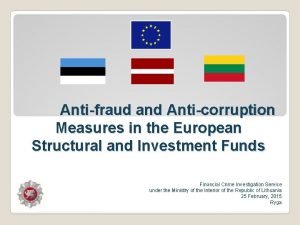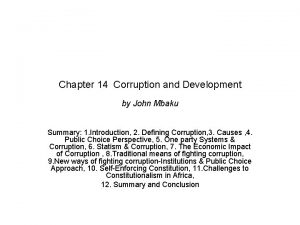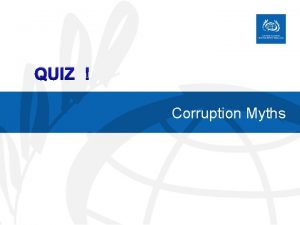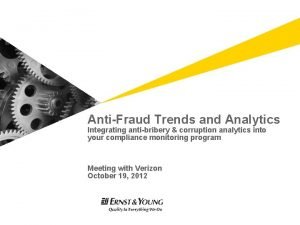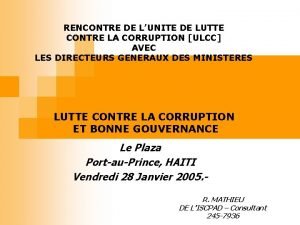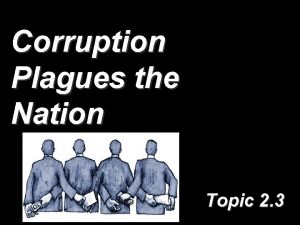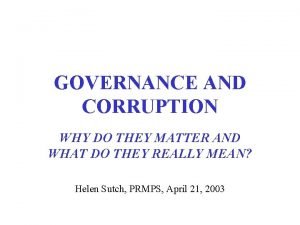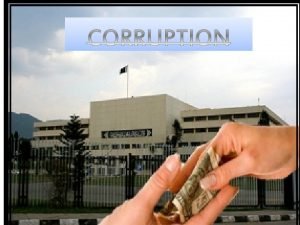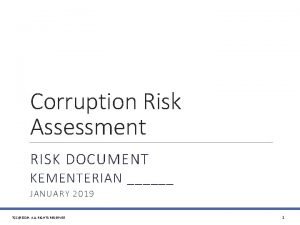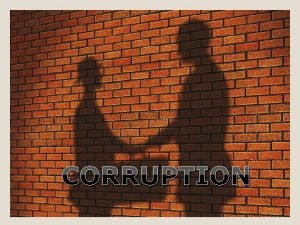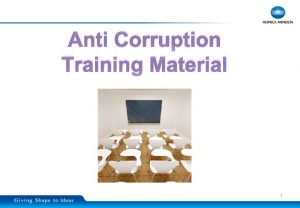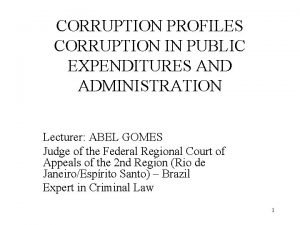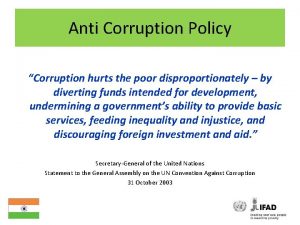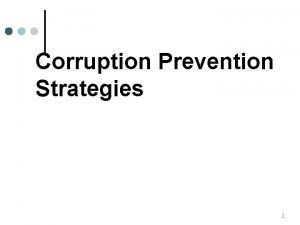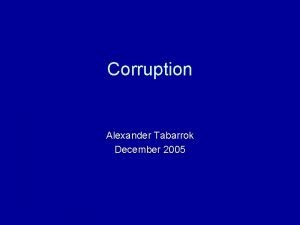Determining the Existence of Corruption in International Disputes






















- Slides: 22

Determining the Existence of Corruption in International Disputes Related to Energy and Natural Resources Projects Red Flags & probatio diabolica IAKL 2019 SEOUL Corruption, Sustainability and Human Rights Energy & Natural Resource Panel 1

Corruption in International Arbitraiton Over the last 20 years, international law has emerged in the areas of anticorruption, money laundering, organized crime, financing of terrorism and the like. States have adopted laws to combat these challenges, applicable to everyday (business) life. Major contracts, some of them concluded in areas most exposed to corruption (e. g. in the infrastructure, natural resources and defense industries as well as sports), are secured by arbitration clauses. The new international standards against corruption and money laundering are not automatically transposed into the world of arbitration. Indeed, it cannot be taken for granted that arbitrators will apply anticorruption and anti-money laundering standards. Since World Duty Free v. Kenya of 2006, it is generally admitted though that corruption and money laundering – whether proven or not – are relevant in arbitration. In both international investment arbitration and commercial arbitration, the “corruption defence” is widely used. 2

National & Int’l Reaction • • • USA Foreign Corrupt Practices Act 1977 UK Bribery Act 2010 in the UK China’s Criminal Law of the People’s Republic of China 1980 Brazil Clean Companies Act 2015 Mexico Anti-Bribery Act 2017 Council of Europe Criminal Law Convention on Corruption, ETS No. 173 (open for signature 27 January 1999) Directive (EU) 2015/849 of the European Parliament and of the Council of 20 May 2015 on the prevention of the use of the financial system for the purposes of money laundering or terrorist financing (OJ L 141, 73117) OECD Convention on Combating Bribery of Foreign Public Officials in International Business Transactions (adopted 21 November 1997) OECD Recommendation of the Council for Further Combating Bribery of Foreign Public Officials in International Business Transactions (adopted 26 November 2009) with Annexes I and II United Nations Convention against Corruption (adopted 31 October 2003 by UN General Assembly resolution 58/4) 3

Corruption & Bribery Corruption exists in many different shapes and sizes. Some forms are clearly illegal, whereas others fall into more of a grey area. In international investment and commercial arbitration, the form of corruption that will frequently be at stake is foreign public bribery, i. e. , the bribery of public officials in the host state by a foreign investor. ► « [C]orruption is more odious than theft; but it does not depend upon any financial loss and it requires no immediate victim. Corruption of a state officer by bribery is synonymous with the most heinous crimes because it can cause huge economic damage; and its long-term victims can be legion » (World Duty Free Company c Republic of Kenya, Arbitral award (Oct. 4, 2006), para 173, CIRDI, 46 ILM 339) Bribery in relation to foreign public officials as defined in Art. 16. 1 of the 2003 UN Convention against Corruption (UNCAC) : ► “the promise, offering or giving to a foreign public official or an official of a public international organization, directly or indirectly, of an undue advantage, for the official himself or herself or another person or entity, in order that the official act or refrain from acting in the exercise of his or her official duties, in order to obtain or retain business or other undue advantage in relation to the conduct of international business. ” 4

Third Party Intermediary Similarly, Art. 1 of the 1997 OECD Convention on Combating Bribery of Foreign Public Officials in International Business Transactions (OECD Anti-Bribery Convention) defines the giving of bribes to foreign public officials as follows: ► “for any person intentionally to offer, promise or give any undue pecuniary or other advantage, whether directly or through intermediaries, to a foreign public official, for that official or for a third party, in order that the official act or refrain from acting in relation to the performance of official duties, in order to obtain or retain business or other improper advantage in the conduct of international business. ” According to the OECD’s study of 427 foreign-bribery enforcement proceedings in 17 countries, three quarters of such proceedings involved third party intermediaries (agents, consultants, etc. ) Indeed, most of the known arbitrations dealing with suspicions of corruption involve intermediary contracts, and that would seem to be the most likely context in which arbitrators will be faced with the decision of whether to investigate corruption. 5

Red Flags Test Over the past few decades of anti-corruption enforcement and compliance efforts, various authorities and organizations have established lists of “red flags” for identifying suspicious relationships that may disguise bribery. A useful list is that found in the ICC Guidelines on Agents, Intermediaries, and Third Parties, which identifies the common red flags as follows: • The operation takes place in a country known for corrupt payments (e. g. , the country received a low score on Transparency International’s Corruption Perceptions Index); • The Third party is suggested by a public official, particularly one with discretionary authority over the business at issue; • The Third party has a close personal or family relationship, or business relationship, with a public official or relative of an official; • The Third party’s commission or fee seems disproportionate in relation to the services to be rendered; • The Third party requires payment of a commission, or a significant portion 6 thereof, before or immediately upon the award of a contract;

Red Flags Test Tailoring other red flag lists in the context of international arbitral proceedings, the following red flags for corruption emerge: • • the intermediary does not have its seat/is not located in the country where its/his/her services are performed; the commission paid to the intermediary is not in proportion to the work done and/or the expenses claimed by the intermediary are not related to any actual expenses incurred; there is no tangible work product by the intermediary and the intermediary is unable to produce documentation for the services performed and the services are not specified in any detail; the qualifications of the intermediary to perform the work for which it/he/she is hired are doubtful; the extent of time of the agent’s intervention is very short; the intermediary demands payment of a commission or a significant portion before the contract is concluded; the intermediary has no transparent structure, an unclear financial organisation and hardly any staff (if the intermediary is a company); lack of usual documentation proving a normal commercial relationship (e. g. technical studies and research, negotiations, drafts of contracts, letters and emails); 7

Red Flags Test: Scope & Limitations All of these red flags should be approached with some caution. • Debatable whether remuneration based on a percentage of the value of the project can be considered suspect (there are vast sectors of the world economy in which this remuneration system is used, in particular if the added value of the work provided cannot be reflected solely in an hourly or daily fee). • Even if the “red flags” could be accepted as evidence of existence of potential corruption, their scope is limited: such indicia are not considered per se sufficient to conclude that there is corruption; and the arbitral tribunals require a higher threshold to conclude to the existence of corruption 8

Red Flags Test: Scope & Limitations Authors and guidelines underline the necessity to minimize the scope of the “red flags”: • “all of these red flags should be approached with some caution. (…) Red flags should not, on their own, suffice to support a finding of corruption without first seeking explanations from the parties”. • “circumstantial evidence [“faisceau d’indices”] may be used to prove corruption (…) In practice, however, tribunals rarely find that the available circumstantial evidence suffices to prove corruption. (…) This suggests that, in spite of lip service paid to circumstantial evidence, tribunals may not be trusting themselves to rely on logical inferences” (“The Arbitral Tribunal’s Duty and Power to Address Corruption Sua Sponte”, D. Baizeau, T. Hayes, International Arbitration and the Rule of Law: Contribution and Conformity, ICCA Congress Series, Vol. 19, p. 250) The presumptions must be used with other elements of proof. “Although such “red flags” may not themselves constitute violations of the antibribery laws” (…) The presence of one or more “red flags” does not necessarily mean that the transaction cannot go forward”. ICC Guidelines on Agents, Section VI, p. 5 9

Red Flags Test: Scope & Limitations Even in cases cited for the proposition that circumstantial evidence be used, the arbitral tribunals held that corruption was not proved: • • “For obvious reasons, it is generally difficult to bring positive proof of corruption. Yet, corruption can also be proven by circumstantial evidence. In the present case, both are entirely lacking. Mere insinuations cannot meet the burden of proof which rests on the Claimants”; (Jan. Oostergetel and Theodora Laurentius v. The Slovak Republic (UNCITRAL) Final Award, April 23, 2012, para. 303 “Alstom companies does not allege that ABL effectively paid kickbacks” and “the existence of an illicit activity is not certainly proved” (translation of original text); (Decision of the Paris Court of Appeal dated 10 April 2018, reference 16/11182, p. 4, that reproduce some parts of the arbitral award (§ 258, § 266 to 275) dated January 29, 2016 Basically, an arbitral tribunal, even in presence of red flags invoked by the alleging party (statements in the content of internal notes, absence of activity of the agent, success fees), concluded that there is no proof of corruption (Société European Gas 10 Turbines SA v. Société Westman International Ltd. Court of Appeal of Paris, chamber C 1, September 30, 1993, published in Revue de l’arbitrage, Vol. 1994, Issue 2,

Corruption & Proof The role of arbitrators is objectively difficult: l there is no commonly agreed standard of proof for allegations of crime in international arbitration. l Furthermore, it remains unclear in which circumstances there may be a reversal of the burden of evidence or the tribunal may draw negative inferences from the lack of cooperation of a party. l Further difficulties arise when it comes to the legal consequences of illegal conduct (like corruption). It is still an open question whether jurisdiction should be denied – a harsh consequence for the investor – or whether the issue should be discussed at the merits stage. 11

Corruption & Standard of Proof • No need for direct evidence • In international arbitration, there will hardly ever be direct evidence for corruption and arbitral tribunals have no coercive powers. It is well established though that bribery can be proven by circumstantial evidence (“faisceau d’indices”), including the above-mentioned red flags. Red flags are not in themselves proof of corruption. However, they are indicators of corruption that should alert arbitrators that further scrutiny must be applied to the facts of the case. • Red flags are part of circumstantial evidence, which can then give rise to proof of corruption. Tribunals may make a firm finding of corruption based on the circumstantial evidence available to them. 12

Corruption & Standard of Proof Options regarding the standard of proof. The arbitrator can resort to • the balance of probabilities or preponderance of evidence standard, which means that the arbitrator will decide in favour of the party whose claims are more likely to be true. • the clear and convincing evidence standard, which is more severe than the balance of probabilities one. • the inner conviction (“intime conviction”) – or conviction beyond any doubt: the arbitrator must be convinced that there is enough evidence to substantiate the corruption allegations or suspicions. A review of a large rank of arbitral awards demonstrates that the majority of arbitral tribunals requires “clear and convincing” evidence of corruption in order to deny any legal effects to an agreement, even in case where circumstantial evidence is admitted. Moreover, some arbitral tribunals required a “beyond any doubt” evidence or “further direct evidence” (Arbitration : Money Laundering, Corruption and Fraud, “Chapt. 7 Arbitration Case Law on Bribery : Issues of Arbitrability, Contract Validity, 13 Merits and Evidence”, M. Adda, 2003, pp. 109 -147)

Corruption & Standard of Proof Specifically, arbitral tribunals require that the party who alleges the corruption effectively proves positive acts that correspond to the legal definition of bribery and the intent of the co-contracting party to be engaged in corruption. In all events, assumptions must be supported by evidence. Indeed, for example, arbitral tribunals held that: ■ “ the proof of bribery may be adopted only if it is established that the amounts paid were intended to bribe officials to trade on their influence to obtain favor. Corruption was not proved since it was not established that the beneficiary of the commission had effectively played a part in respect of the concessions … [o]n the contrary, the concessions have not been granted yet (…) Moreover, the arbitral tribunal found that the amounts pertaining to the agreements with the intermediary were never paid. Hence, no corruption could have been committed” ( ICC Case No. 6286) ■ “the standard to be applied in weighing the evidence was the “preponderance” of evidence (…) taking into account, however, that with respect to the allegation of corruption, a higher standard if clear and convincing evidence would apply (…) it must be proved to exist by clear and convincing evidence amounting to more than a mere preponderance, and cannot be justified by mere speculation” (Westinghouse Int’l Projects Co. , Westinghouse Elec. S. A. and BARNS 1 Roe Enterprises, Inc. v. Nat’l Power Corp. and the Republic of the Philippines, ICC Case No. 6401, 1992) 14

Corruption & Standard of Proof ■ “in the Hilmarton case (. . ) the evidence (witness statements and the amount of the commission) was not sufficient to establish with certainty the existence of corruption” (Hilmarton Ltd. v. Omnium e Traitement et Valorisation S. A. , ICC Case No. 5622, 1992); ■ “the defendant’s accusation is not supported by direct evidence or even circumstantial evidence to be retained as convincing (…) a fact can be considered as proven even by the way of circumstantial evidence. However, such circumstantial evidence must lead to a very high probability” (Establishment of Middle East country X v. South Asian construction Company, Interim Award, ICC Case No. 4145, 1983, in Albert Jan van den Berg (ed), Yearbook Commercial Arbitration 1987, Vol. XII , pp. 97 -110, para. 27) ■ “in the present case, bribery has not been proved beyond doubt. It is true that it is possible to prove something through indirect evidence (…). However, it is necessary that sufficient ensemble of indirect evidence be collected to allow the judge to base his decision on something more than likely facts, i. e. facts which have not been proven. Thus, evidence of bribery has not been given and the indirect evidence is not sufficiently relevant” (Broker v. Contractor, Final Award, ICC Case No. 5622, 1988, in Albert Jan van den Berg (ed), Yearbook Commercial Arbitration 1994, Vol. XIX, pp. 105 -123, § 23) 15

Burden of Probatio diabolica • Probatio diabolica ("devil's proof") is a legal requirement to achieve an impossible proof. Where a legal system would appear to require an impossible proof, the remedies are reversing the burden of proof, or giving additional rights to the individual facing the probatio diabolica. The Devil's Proof is the logical dilemma that while evidence will prove the existence of something, the lack of evidence fails to disprove it. Absence of evidence is (or is not) evidence of absence? In essence, the opposing statement's lack of proof makes the statement true in some sense. This connects with the idea that, while substantial evidence may prove the devil's existence, there is no evidence that denies the devil's existence; therefore, one cannot deny the devil's existence. 16

Burden of Proof : actori incumbit probatio • The principle actori incumbit probatio, is constantly applied by internatioanl arbitration and most of the modern legal systems. The burden of proving a claim lies with the party presenting it » . Art. 27(1) of the Arbitration Rules of the UN commission for international commercial law (Règlement d’arbitrage de la Commission des Nations Unies pour le droit commercial international (CNUDCI), version 2010, stipulates « chaque partie doit apporter la preuve des faits sur lesquels elle fonde ses chefs de demande ou ses moyens de défense » ) Règlement d’arbitrage CNUDCI (2010), art 27(1)) 17

Probatio diabolica vs. actori incumbit probatio • “If a claimant asserts claims arising from a contract, and the defendant objects that the claimant’s rights arising from the contract are null due to bribery, it is up to the defendant to present the fact of bribery and the pertaining evidence (…); The statement of facts and the burden of proof are therefore upon the defendant” (Consultant v. State agency and others, Final Award, ICC Case No. 7047, 1994, § 50 and seq) • “The burden of proof lies with the claimant as the party alleging solicitation of a bribe. Clear and convincing evidence should have been produced by the claimant showing not only that a bribe had been requested from Mr. Weil, but also that such request had been made not in the personal interest of the person soliciting the bribe, but on behalf and for the account of the Government authorities in Romania. In the absence of such evidence, the Tribunal is compelled to draw the conclusion that the Claimant did not sustain its burden of proof” (EDF (Services) Limited v. Romania, ICSID Case No. ARB/05/13, Award, October 8, 2009, § 232) 18

Probatio diabolica vs. actori incumbit probatio On the basis of this core rule of burden of proof, the arbitral awards as well as the doctrine expressly refuse to shift onto the accused party the burden to produce rebuttal evidence and the risk of the absence of such a rebuttal evidence. Indeed, for example, Mr. Daniel Goldenbaum underlines that the proposal made by very few commentators to shift the burden of proof in case of a prima facie evidence (“commencement de preuve”) could affect the due process because it is extremely difficult to prove a negative fact. The author states that if it is difficult to prove the payment of kickbacks, prove their absence is impossible. Moreover, such a practice would constitute an abuse of right by allowing a party to raise allegations of corruption solely to avoid performing its contractual obligations. 19

Probatio diabolica vs. actori incumbit probatio ► While arbitrators are not state judges, they do fulfil a certain public function because – in general terms – arbitral awards are enforceable like court decisions. Furthermore, arbitrators have a duty to issue an enforceable award. If arbitrators ignore issues of corruption, there is a risk that their award will be challenged in front of state courts in set-aside proceedings or at the enforcement stage on the ground that it is contrary to the national or transnational public policy. ► If there are indicators of corruption in a case, one possibility is for arbitrators to ask the parties, by means of procedural orders, for written or oral information that would substantiate or rebut the corruption allegations or suspicions. Generally speaking, parties in international arbitration have a duty to cooperate with the tribunal. 20

Legal consequences if corruption is established in arbitration • Consider nullity if a party attempts to enforce contracts for bribery • In principle, the national law applicable to the substance of the dispute will decide the legal consequences of a contract for bribery. • Frequently, contracts for bribery will be unenforceable or null and void ab initio. If the contract is void, many legal systems will not allow for restitution whereas others may allow a party to claim restitution in case where the tribunal finds the contract to be void. 21

James Joong Ho KIM Managing Partner james. kim@archelegal. com ARCHE (아르케) Selarl Société d’Avocat Paris / Hong Kong / Singapore / Seoul www. archelegal. com 22
 Consumer disputes redressal agencies
Consumer disputes redressal agencies Examples of locational boundary disputes
Examples of locational boundary disputes Chapter 4 settling disputes
Chapter 4 settling disputes Change order disputes
Change order disputes Evolution of the contemporary political pattern
Evolution of the contemporary political pattern Anatomy of industrial disputes
Anatomy of industrial disputes Examples of antecedent boundary
Examples of antecedent boundary Consumer disputes redressal agencies
Consumer disputes redressal agencies Why might fishing disputes arise in the region?
Why might fishing disputes arise in the region? Anti-corruption efforts
Anti-corruption efforts Summary of corruption
Summary of corruption Corruption quiz
Corruption quiz Uk bribery act training slides
Uk bribery act training slides Anti bribery and corruption analytics
Anti bribery and corruption analytics Corruption conclusion
Corruption conclusion Police introduction
Police introduction Corruption plagues the nation
Corruption plagues the nation Chapter 3 great gatsby summary
Chapter 3 great gatsby summary Macbeth corruption
Macbeth corruption Corruption
Corruption Chapter 3 quotes
Chapter 3 quotes What are the characteristics of corruption
What are the characteristics of corruption Corruption risk assessment
Corruption risk assessment
